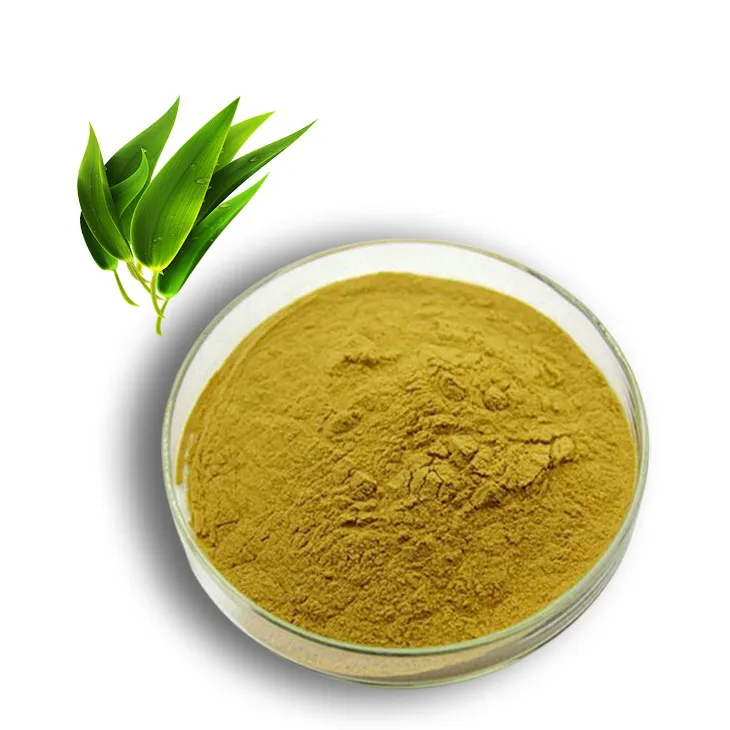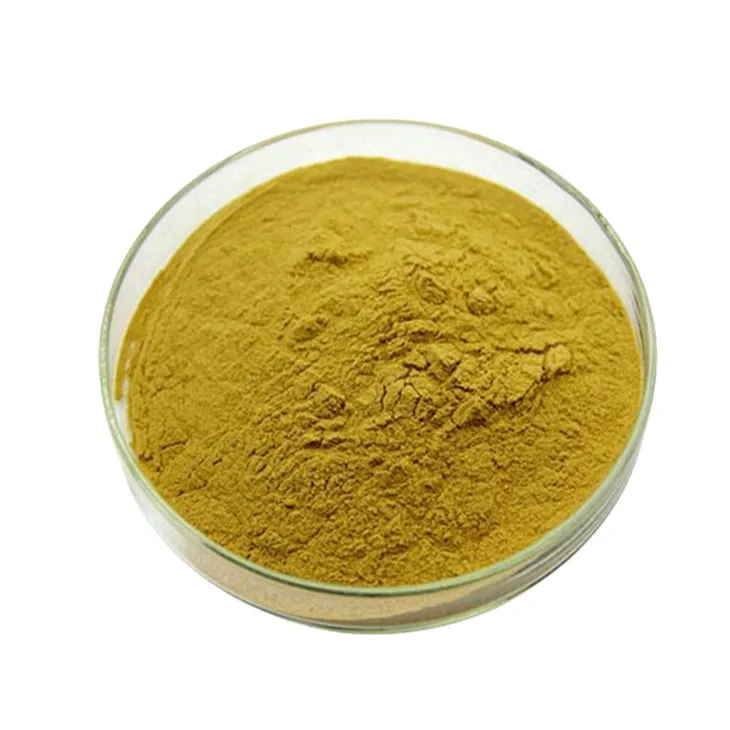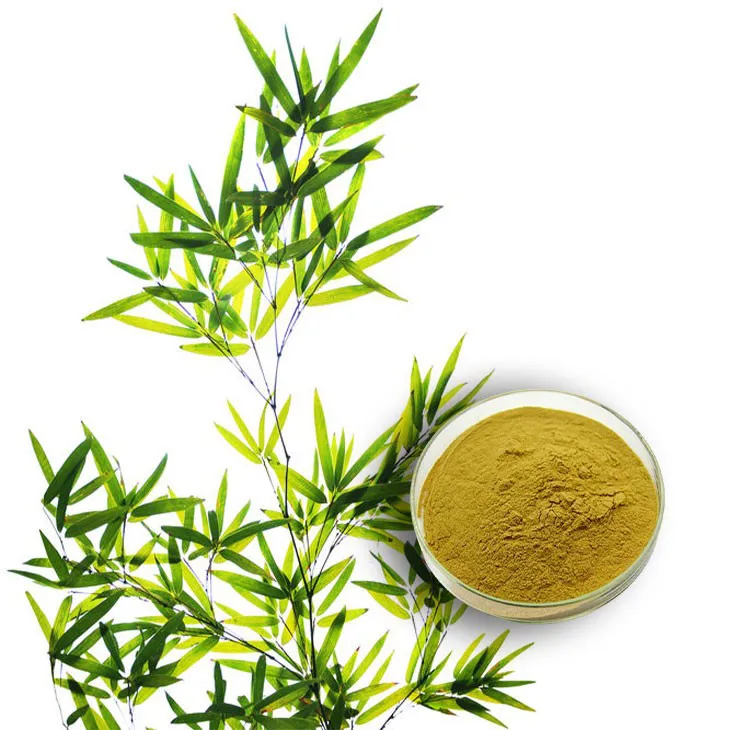- 0086-571-85302990
- sales@greenskybio.com
Bamboo Leaf Extract Suppliers.
2024-11-27

Introduction
In today's market, the demand for natural and health - promoting substances has been steadily increasing. Among these, Bamboo Leaf extract has emerged as a highly sought - after product. Bamboo leaves are rich in a variety of nutrients and bioactive components, such as flavonoids, phenolic acids, and polysaccharides. These components endow Bamboo Leaf extract with numerous potential health benefits, including antioxidant, anti - inflammatory, and anti - microbial properties. As a result, the role of Bamboo Leaf extract suppliers has become crucial in meeting the growing market demand.

Factors to Consider When Choosing a Bamboo Leaf Extract Supplier
1. Reputation
The reputation of a supplier is one of the most important factors to consider. A well - established supplier with a good track record is more likely to offer high - quality products. Positive reviews from previous customers can be a strong indicator of a supplier's reliability. Suppliers who have been in the industry for a long time often have a better understanding of the market and customer needs. They are also more likely to have established quality control procedures and a stable supply chain. For example, a supplier that has been consistently providing bamboo leaf extract to major health - food companies without any quality issues is likely to be a trustworthy choice.
2. Quality of the Extraction Process
The quality of the extraction process significantly affects the final product. State - of - the - art facilities and experienced technicians are essential for ensuring that the bamboo leaf extract retains its beneficial properties. Advanced extraction techniques can help to maximize the yield of bioactive components while minimizing the loss of nutrients. For instance, modern extraction methods such as supercritical fluid extraction can extract flavonoids more efficiently compared to traditional solvent extraction methods. Suppliers should also have strict quality control measures in place to monitor the purity and potency of the extract. This may include testing for the presence of contaminants and ensuring that the concentration of active ingredients is within the specified range.
3. Environmental Consciousness
Being environmentally conscious is another crucial aspect for bamboo leaf extract suppliers. Sustainable sourcing of bamboo leaves is not only beneficial for the environment but also ensures the long - term availability of the raw material. Bamboo is a fast - growing plant, but improper harvesting can still have a negative impact on the ecosystem. Suppliers should adhere to sustainable harvesting practices, such as only harvesting mature bamboo leaves and leaving enough foliage for the plant to regenerate. Additionally, they should strive to minimize their environmental footprint in other aspects of their operations, such as reducing energy consumption during the extraction process and properly disposing of waste.
4. Price Competitiveness
While quality is of utmost importance, price competitiveness also plays a significant role. Suppliers need to be able to offer their products at a reasonable price without sacrificing quality. This allows their products to be accessible to a wide range of customers in different industries, including the food, pharmaceutical, and cosmetic industries. However, it is important to be cautious of suppliers offering extremely low prices, as this may be an indication of sub - standard products or unethical business practices. A balance between quality and price needs to be struck, and suppliers who can achieve this are more likely to succeed in the market.

Quality Assurance in Bamboo Leaf Extract Supply
1. Raw Material Selection
The selection of high - quality bamboo leaves as the raw material is the first step in ensuring the quality of the extract. Suppliers should source bamboo leaves from healthy and uncontaminated bamboo plants. Different species of bamboo may have varying levels of bioactive components, so suppliers may need to carefully select the appropriate species based on the intended use of the extract. For example, some species may be richer in flavonoids, while others may have higher levels of polysaccharides. Additionally, the geographical origin of the bamboo can also affect the quality of the leaves, as factors such as soil quality, climate, and altitude can influence the composition of the leaves.
2. Manufacturing Standards
Adhering to strict manufacturing standards is essential for producing high - quality bamboo leaf extract. This includes following good manufacturing practices (GMP) in the extraction, purification, and packaging processes. GMP ensures that the production environment is clean, hygienic, and free from contaminants. Suppliers should also have proper documentation and record - keeping procedures to track the entire production process, from the sourcing of raw materials to the final packaging of the extract. This enables traceability and helps to identify and resolve any quality issues that may arise.
3. Product Testing
Regular product testing is necessary to verify the quality and safety of the bamboo leaf extract. Suppliers should conduct a variety of tests, such as chemical analysis to determine the composition of the extract, including the concentration of bioactive components. Microbiological testing should also be carried out to check for the presence of harmful bacteria, fungi, or other microorganisms. In addition, safety tests, such as toxicity testing, may be required, especially if the extract is intended for use in pharmaceutical or food products. These tests help to ensure that the extract meets the required quality and safety standards.

The Role of Bamboo Leaf Extract Suppliers in Different Industries
1. Food Industry
In the food industry, bamboo leaf extract can be used as a natural food additive. Its antioxidant properties can help to extend the shelf life of food products by preventing oxidative rancidity. For example, it can be added to oils, fats, and baked goods to improve their stability. Bamboo leaf extract can also be used to develop functional foods, such as health - promoting beverages or snacks. Suppliers play a crucial role in providing food - grade bamboo leaf extract that meets the strict safety and quality requirements of the food industry. They need to ensure that the extract is free from any harmful substances and has a consistent quality.
2. Pharmaceutical Industry
The pharmaceutical industry is interested in the potential medicinal properties of bamboo leaf extract. Flavonoids and other bioactive components in the extract may have anti - inflammatory, anti - microbial, and anti - cancer properties. Suppliers need to produce high - purity bamboo leaf extract for pharmaceutical research and development. They must also comply with the strict regulatory requirements of the pharmaceutical industry, such as Good Laboratory Practice (GLP) and Good Clinical Practice (GCP). This includes ensuring the traceability of the raw material, the accuracy of the extraction process, and the safety and efficacy of the final product.
3. Cosmetic Industry
In the cosmetic industry, bamboo leaf extract can be used as an ingredient in skin - care and hair - care products. Its antioxidant and anti - inflammatory properties make it suitable for products that aim to protect the skin from environmental damage and reduce inflammation. For example, it can be added to moisturizers, serums, and shampoos. Bamboo leaf extract suppliers need to provide cosmetic - grade extract that is free from impurities and has a pleasant odor. They also need to ensure that the extract is stable and compatible with other cosmetic ingredients.

Challenges Faced by Bamboo Leaf Extract Suppliers
1. Market Competition
The growing demand for bamboo leaf extract has led to increased market competition among suppliers. There are now numerous suppliers in the market, both large and small. This competition can make it difficult for suppliers to stand out and gain market share. To overcome this challenge, suppliers need to focus on differentiating themselves through product quality, innovation, and customer service. For example, a supplier may develop a unique extraction process that results in a higher - quality extract, or they may offer customized product formulations to meet the specific needs of customers.
2. Regulatory Compliance
As bamboo leaf extract is used in various industries, suppliers need to comply with different regulatory requirements. Regulatory compliance can be a complex and time - consuming process, especially when dealing with international markets. For example, in the food industry, suppliers need to meet the food safety regulations of different countries, which may vary in terms of maximum residue limits, labeling requirements, and quality standards. In the pharmaceutical and cosmetic industries, there are also strict regulatory requirements regarding product safety, efficacy, and quality. Suppliers need to stay updated on the latest regulations and ensure that their products meet all the necessary requirements.
3. Supply Chain Management
Effective supply chain management is crucial for bamboo leaf extract suppliers. The supply chain for bamboo leaf extract involves multiple stages, from the sourcing of bamboo leaves to the delivery of the final product to customers. Any disruptions in the supply chain, such as natural disasters affecting bamboo growth, transportation issues, or problems with raw material suppliers, can impact the availability and quality of the extract. Suppliers need to have contingency plans in place to mitigate these risks and ensure a stable supply of high - quality extract.
Future Trends in Bamboo Leaf Extract Supply
1. Technological Advancements
Technological advancements are expected to play a significant role in the future of bamboo leaf extract supply. New extraction techniques may be developed that are more efficient, environmentally friendly, and cost - effective. For example, the use of biotechnology may enable the production of bioactive components from bamboo leaves in a more targeted and sustainable manner. Additionally, advances in analytical techniques will allow for more accurate quality control and product characterization, ensuring that the extract meets the highest standards.
2. Expansion of Applications
The expansion of applications for bamboo leaf extract is another trend to watch. As research on the health benefits of bamboo leaf extract continues, new applications are likely to be discovered in various industries. For example, in the nutraceutical industry, bamboo leaf extract may be developed into new dietary supplements with specific health claims. In the textile industry, it may be used to develop antibacterial and antioxidant - rich fabrics. Suppliers will need to be adaptable and able to meet the changing demands of different industries as new applications emerge.
3. Sustainable and Ethical Sourcing
There will be an increasing emphasis on sustainable and ethical sourcing of bamboo leaves. Consumers are becoming more conscious of the environmental and social impacts of the products they purchase. Suppliers will need to demonstrate their commitment to sustainable and ethical practices, such as fair trade with bamboo growers and the use of environmentally friendly harvesting methods. This will not only help to meet consumer expectations but also contribute to the long - term viability of the bamboo leaf extract industry.
FAQ:
What should I consider when choosing a bamboo leaf extract supplier?
When choosing a bamboo leaf extract supplier, you should consider factors such as the supplier's reputation. A well - established supplier with positive reviews is more likely to offer reliable products. The quality of the extraction process is also crucial, and state - of - the - art facilities and experienced technicians can ensure the extract retains its beneficial properties. Additionally, the supplier should be environmentally conscious for sustainable sourcing, and be able to offer competitive prices without sacrificing quality.
Why is the reputation of a bamboo leaf extract supplier important?
The reputation of a bamboo leaf extract supplier is important because a well - regarded supplier with positive reviews and a long - standing presence in the industry is more likely to provide high - quality, reliable products. They are more likely to have a track record of meeting customer expectations and adhering to industry standards.
How can I ensure the quality of bamboo leaf extract from a supplier?
To ensure the quality of bamboo leaf extract from a supplier, you can look at their extraction process. Suppliers with state - of - the - art facilities and experienced technicians are more likely to produce high - quality extracts that retain the beneficial properties of bamboo leaves. You can also check for quality certifications or test results.
What does it mean for a bamboo leaf extract supplier to be environmentally conscious?
For a bamboo leaf extract supplier to be environmentally conscious means that they engage in sustainable sourcing of bamboo leaves. This is beneficial for the environment as it helps to preserve the bamboo ecosystem. It also ensures the long - term availability of the raw material for the production of bamboo leaf extract.
Can a bamboo leaf extract supplier offer competitive prices and high quality at the same time?
Yes, a good bamboo leaf extract supplier should be able to offer competitive prices without compromising on quality. They can achieve this through efficient production processes, good relationships with raw material sources, and economies of scale. This makes their products accessible to a wide range of customers in different industries.
Related literature
- Bamboo Leaf Extract: Properties and Potential Applications"
- "Sourcing and Quality Control of Bamboo Leaf Extracts in the Natural Products Market"
- "The Role of Bamboo Leaf Extract Suppliers in the Health - Promoting Substances Industry"
- ▶ Hesperidin
- ▶ citrus bioflavonoids
- ▶ plant extract
- ▶ lycopene
- ▶ Diosmin
- ▶ Grape seed extract
- ▶ Sea buckthorn Juice Powder
- ▶ Beetroot powder
- ▶ Hops Extract
- ▶ Artichoke Extract
- ▶ Reishi mushroom extract
- ▶ Astaxanthin
- ▶ Green Tea Extract
- ▶ Curcumin Extract
- ▶ Horse Chestnut Extract
- ▶ Other Problems
- ▶ Boswellia Serrata Extract
- ▶ Resveratrol Extract
- ▶ Marigold Extract
- ▶ Grape Leaf Extract
- ▶ blog3
- ▶ blog4
-
Extraction process of stevia extract.
2024-11-27
-
Chinese Grape Seed Extract Powder Factory.
2024-11-27
-
Vitamin K2 in China vs. the United States.
2024-11-27
-
Nature's Bounty L - Arginine
2024-11-27
-
Gynostemma pentaphyllum extract
2024-11-27
-
Cat Claw Extract
2024-11-27
-
Natural grape seed extract
2024-11-27
-
Golden Seal Extract
2024-11-27
-
Sugarcane Extract
2024-11-27
-
Hawthorn Extract
2024-11-27
-
Lavender Extract
2024-11-27
-
Red Wine Extract
2024-11-27
-
Rose Hip Extract
2024-11-27
-
Apricot Powder
2024-11-27





















